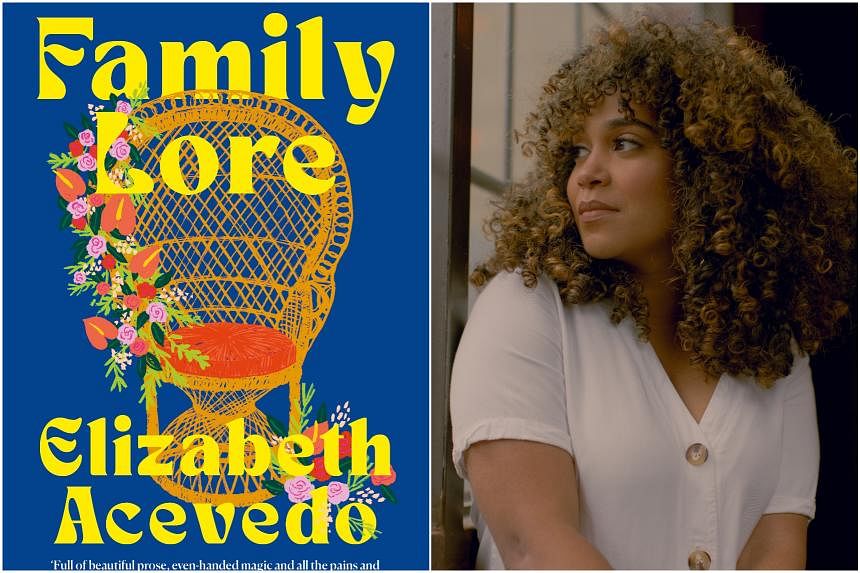Family Lore
By Elizabeth Acevedo Fiction/Canongate Books/Paperback/364 pages/$36.14/Amazon SG (amzn.to/3qOSOgL)4 stars
A banquet for one’s death without immediate cause may sound perverse and megalomaniac. But when the matriarch throwing it is known for having prescience in matters of mortality, the rest of the family sits up and takes notice.
Flor, an immigrant to America from the Dominican Republic, has built a life she can be proud of in The Big Apple with her three sisters.
One day, she is inspired by the scene of a living wake in a Netflix documentary, and goes about arranging her own in her family group chat.
Written with lyricism and thorough care for the characters, Family Lore is Dominican-American poet Elizabeth Acevedo’s first adult offering.
She is best known for The Poet X (2018), the young-adult novel which won the United States National Book Award for Young People’s Literature.
Family Lore expands on the same themes of family dynamics and sexuality, but through a polyphony of voices.
The whole story spans the three days leading up to Flor’s death bash, alternating between the perspectives of six Dominican-American women across two generations.
Giving the proceedings extra interest is the conceit that the women’s family “comes from magic”.
Flor’s nightmares warn of imminent death. Her younger sister Pastora has an acute ear for whether someone is telling the truth.
Anthropology professor Ona, Flor’s daughter, has preternatural control of her genitals and can affect the menstrual cycles of those around her.
Yadi, Pastora’s daughter, has a way with lime and whips up vegetarian dishes that are extremely addictive – a blessing she puts to lucrative use by opening her own restaurant.
These injections of magical realism are hardly the stuff of fantasy bravado, and could conceivably be seen as worldliness, sexual wiles or other skills that the women have evolved to navigate the world around them.
The same understated touch is applied to the women’s general environment.
Though set in metropolitan New York, the characters have settled into a black enclave and found a rhythm to their lives – literally, in the case of a salsa class.
The absence of racism or feelings of alienation in white-dominated spaces allow the women’s self-sufficient lives to breathe in a way that feels natural and empowering.
Making for subtle and poignant drama is Yadi’s reaction to the release of her childhood sweetheart from jail; Pastora’s struggles with her sisterly feelings after catching her cheating brother-in-law; and Ona’s own insistence on trying to conceive a child after womb surgery – all amid speculation about whether Flor has dreamt her own death.
Perhaps the only indelicate conceit is the meta-structure which Acevedo has given the narrative.
Each chapter returns the women to some point in time past relevant to their present indecision, which can feel a bit rote.
Insertions via indentations or parentheses suggest the narrative has been retroactively pieced together by Ona in a personal anthropological study, though this realisation does not really matter.
But Ona’s interludes allow for cultural education and commentary.
On Yadi’s boyfriend joining a gang in New York, she harks back to the Wolof Africans rebellion in 1521, when a group of slaves revolted against its Spanish owners in the colony of Santo Domingo.
She writes: “Every descendant of enslavement, of that inherited and invasive oppression, dreams of an island of their own, a slice of communal freedom.”
What emerges is a far-reaching family saga that is a female Dominican-American version of Colombian author Gabriel Garcia Marquez’s One Hundred Years Of Solitude, dealing with the coexistence of eros and thanatos, life and death.
It is an artful and utterly satisfying transition by Acevedo to the adult’s table.
If you like this, read: The House Of The Spirits by Isabel Allende (Atria Books, 2015, $20.93, Amazon SG, go to amzn.to/3Rak2Jx), about four generations of the Trueba family with a peculiar connection to death, set amid the post-colonial social and political upheavals of Chile.
Book review: Colson Whitehead steals the show in slick crime novel Crook Manifesto
This article contains affiliate links. If you buy through these links, we may earn a small commission.
Join ST’s Telegram channel and get the latest breaking news delivered to you.
p.st_telegram_boilerplate:before {
display: inline-block;
content: ” “;
border-radius: 6px;
height: 6px;
width: 6px;
background-color: #12239a;
margin-left: 0px;
margin-right: 13px;
}
a.st_boilerplate {
font-family: “SelaneWebSTForty”, Georgia, “Times New Roman”, Times, serif;
}


